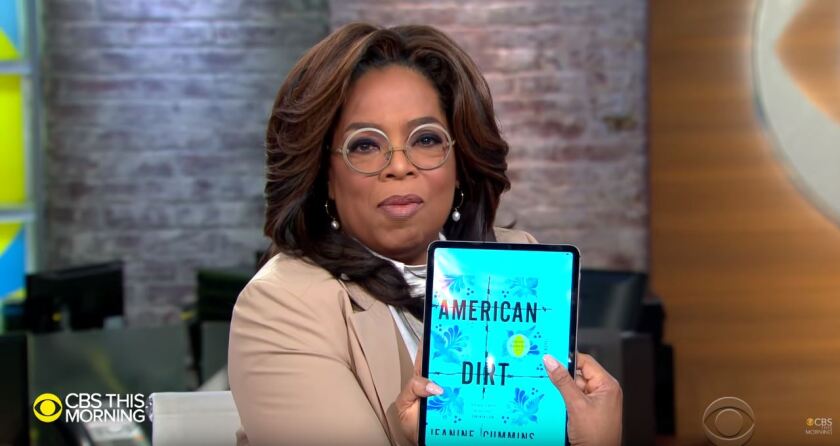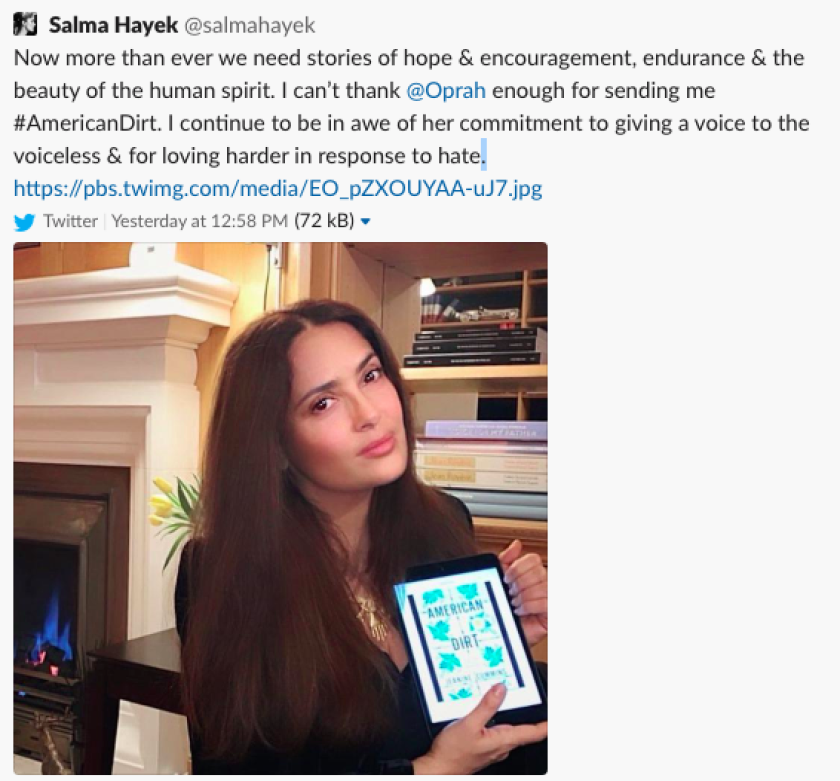It was poised to be a blockbuster long before copies arrived in bookstores last week: a thrilling contemporary migration story following a mother and her son, desperate to cross Mexico and reach the United States.
Its publisher, Flatiron Books, an imprint of Macmillan, paid a seven-figure advance after outbidding several competitors for the novel. It snagged a coveted selection in Oprah’s Book Club and had been shipped to key celebrity influencers, including Stephen King, Sandra Cisneros, and Salma Hayek. A reported first run of 500,000 copies was printed. The film rights were sold.
But by week’s end, the novel “American Dirt” had garnered attention that its boosters likely didn’t expect: angry charges of cultural appropriation, stereotyping, insensitivity, and even racism against author Jeanine Cummins, who herself said in the book’s author’s note, “I was worried that, as a nonmigrant and non-Mexican, I had no business writing a book set almost entirely in Mexico, set entirely among migrants.”
Despite the backing of towering figures in American media, Cummins’ page-turning portrayal of a mother on the run is now at the center of the first bonafide literary controversy of the year, and is forcing a hard reflection on the state of Latinos in a cultural field that remains overwhelmingly white.
In the face of critiques, Cummins is pushing back in public. Her publisher released a statement encouraging discussion around the title, while some authors and booksellers have come to Cummins’ defense. In a culture that is used to debating black and Asian representation and stereotypes, the entrenchment around “American Dirt” is fueling even more complaints over the ease with which popular culture still employs Latino-related stereotypes in contemporary movies, television, and fiction.
“American Dirt” is also highlighting factors that observers say have contributed to a near shutout of contemporary Mexican and Mexican American voices from the top tier of the publishing publicity machine — the sorts of books that are guaranteed handsome sales by virtue of projection.
What went wrong?
As passages from the novel began emerging last month, Mexican and other Latino voices began raising red flags. The author’s portrayal of Mexican culture was called outlandish, littered with stereotypes, stilted bilingualism and an awkward peppering of italicized Spanish phrases.
“I assert that American Dirt fails to convey any Mexican sensibility,” said Long Beach writer Myriam Gurba in an early negative review that became a catalyst of the controversy.
It is the marketing of this brown and black pain.
LILLIAM RIVERA, AUTHOR
“American Dirt” has also sparked an emotional discussion about how far the publishing industry still must go to more richly represent the scope and diversity of the Latino experience, said authors, literary agents, and other industry figures in interviews last week. It’s a discussion focused on a complicated question: Who gets to frame others’ stories, and how?
Barbed-wire centerpieces
Publishing, like Hollywood, has yet to fully confront its lack of diversity involving Latinos, the largest nonwhite demographic and now largest minority voting group in the United States. A 2019 Publishers Weekly study based on a self-reported survey of 699 industry respondents found that Latinos comprised just 3 percent of the publishing workforce in 2018. An earlier Diversity Baseline Survey conducted in 2015 by Lee & Low Books found that Latinos represented 6% of the publishing industry overall, while whites were 79%.
“American Dirt” has opened a window into the ways a few select books are brought to the public’s attention at a time when many authors have to hire their own publicists or arrange their own book readings and events. The roll-out to some took on the veneer of insult to Central American trauma and pain surrounding the treacherous passage through Mexico.
“They’re handling it like they handle a Marvel comics movie,” said Roberto Lovato, a Salvadoran American writer in San Francisco, who is finalizing an upcoming memoir. “But this industry will make you dance the minstrel salsa dance or the minstrel cumbia dance,” he added, in reference to the tenor of Latino-themed titles that are deemed palatable to wide audiences.
Indeed, the operation behind “American Dirt” made what many describe as cringe-worthy errors even before the book hit stores.
Back in May, Flatiron Books hosted a dinner for Cummins during a booksellers convention in New York, a sign that the novel would have strong publisher support. On the tables at the dinner were barbed-wire centerpieces holding flowers. Evoking a border wall, the table decorations, complete with faux barbed wire made from twigs, played off the novel’s cover design. Critics found a photo Cummins posted of the centerpieces on her Twitter account, and have circulated the image as a symbol of the publisher’s insensitivity.
“It’s disturbing to see a publishing dinner with barb-wire centerpieces,” said Lilliam Rivera, the L.A.-based Puerto Rican author of successful young adult novels. “It is the marketing of this brown and black pain.”

Myriam Chingona Gurba de Serrano@lesbrains · Jan 22, 2020

At an #AmericaDirt party, guests dined while BARBED WIRE CENTER PIECES adorned the tables. You know, to evoke border chic.

Myriam Chingona Gurba de Serrano@lesbrains

1,4888:09 AM – Jan 22, 2020Twitter Ads info and privacy451 people are talking about this
More criticism followed among Latino writers, from the fringes to the center of the literary power establishment. Mexican author Valeria Luiselli, a MacArthur Foundation “genius” grant recipient, called the book the “worst possible” pick for Oprah’s nod. Francisco Goldman, the celebrated Guatemalan American novelist, and journalist who divides his time between New York and Mexico City, said in an interview he was “shocked” by the “tone-deaf” publicity roll-out. “And these are supposedly sophisticated people.”
When Oprah Winfrey’s super-charged publicity campaign for “American Dirt” launched Tuesday, with the announcement of her book club pick on “CBS This Morning” and on Winfrey’s social media accounts, the already-simmering anger over the novel only grew.

Critics noted a string of similar casual-seeming social posts from famous figures such as Yalitza Aparicio (“Roma”), MJ Rodriguez (“Pose”) and Gina Rodriguez (“Jane the Virgin”). Hayek, the Academy Award-nominated Mexican actress, posted her own glowing review for “American Dirt” later in the week, then deleted it on Friday. “I confess I have not read it and was not aware of any controversy,” she said on Instagram. Each entertainer displayed an e-reader version of the novel and nearly all of them thanked Winfrey for sending the book, hinting at a multiplatform publicity campaign.

Not everyone went along. Kate Horan, the director of the McAllen Public Library in Texas, posted portions of a letter she sent to the American Library Assn. and Oprah’s Book Club, declining to participate in a recorded “unboxing” event meant to push “American Dirt.” Horan said she felt compelled to turn down the offer from Oprah’s Book Club after seeing the reactions among Latinx writers she and her staff admire.
“When we took the book out, our hearts dropped,” Horan said in a telephone interview from Philadelphia, where the American Library Assn. is holding its mid-winter conference. “There followed many conversations with people in my community, and of course reading the book, I can only compare it to a telenovela. It’s so hyper stereotyped, that it’s harmful.” (The McAllen public library will still have a dozen copies of the book for checkout, Horan said.)
A muddled identity
Buzz around “American Dirt” had been building since 2018, when it was sold at auction to Flatiron editor Amy Einhorn, who is known for acquiring the novel “The Help” — a bestseller whose white author was criticized for, among other things, comparing a black maid character’s skin to a cockroach. Cummins’ book scored blurbs from not only King and Cisneros, but also Don Winslow and John Grisham. Winslow, who called “American Dirt” “a ‘Grapes of Wrath’ for our times,” and others defended their endorsements of the book.
“I read the book and I loved it. That experience can’t be changed by people who don’t like it,” said novelist Ann Patchett, who called “American Dirt” a “moral compass” in her quote for the title. “There’s a level of viciousness that comes from a woman getting big advance and a lot of attention,” she added. “If it had been a small advance with a small review in the back of the book section, I don’t think we’d be seeing the same level of outrage.”
By week’s end, as the U.S. commercial publishing industry was reeling from the expanding maelstrom over what its critics called a cartoonish melodrama about contemporary Mexico, Cummins still hit the road on a book tour. At an industry conference last week in Baltimore, she defended her right to write the novel from the perspective of the Mexican woman at the heart of her book.
Her character Lydia, 32, is middle-class, college-educated wife and mother who owns a bookshop in the resort city of Acapulco and survives a bloody massacre at a family quinceañera. With her journalist husband and other family members killed, the bookish protagonist and her 8-year-old son make a desperate run for the U.S. border, partly on the freight train La Bestia. Critics have mocked the narrative ploy as implausible for anyone of Lydia’s class stature, who can usually buy airline or bus tickets.
In Baltimore, Cummins said the migrants she met during her research for the novel “made me recognize my own cowardice” as she grappled with early failed drafts and doubts about authenticity. “When people are really putting their lives on the line, to be afraid of writing a book felt like cowardice,” she said, according to a report for the trade site Publishers Lunch.
The author, who did not respond to a request for comment for this article, identified as white as recently as 2016. On Wednesday, Cummins, whose grandmother was from Puerto Rico, said she was “a Latinx woman” while addressing the negative reactions to the book among Mexican, Central American and Chicano readers who have vigorously questioned her authorial integrity. “Not everyone needs to love my book,” she said.
On Friday, Cummins turned up her defense during an interview with NPR: “I am a white person. … I am a person who has a very privileged life. I am also Puerto Rican. … That fact has been attacked and sidelined by people who, frankly, are attempting to police my identity.”
But her critics weren’t buying it.
Gurba and others accused Cummins of profiting off Latina identity and transforming her own ethnicity over time to suit professional interests. “She became a person of color for the sake of financial convenience,” Gurba told The Times. “I call that POC, a person of convenience.”
Another set of earlier photos of Cummins with barbed-wire decorated fingernails brought even more criticism. “Every day I see something new that pertains to this, that it seems like it can’t get worse, and it gets worse,” said YA author Rivera.
Cummins’ somewhat apologetic author’s note also fanned the flames. In it, she says she wished someone “slightly browner” than her had written her book. She also argued that her effort seeks to counter depictions of immigrants as a “faceless brown mass.” Goldman, reached in New York, called the phrase an admission to the book’s “pornographic feedback of violence.”
“It’s just unbelievable,” he said Thursday. “How mediocre, third-rate and sleazy it is for a fiction writer to appropriate violence and suffering that way.”
In her note, he added, Cummins also writes, “we seldom think of [migrants] as human beings.”
“Who is that ‘we’?” Goldman said. “It sounds like Donald Trump Jr. was doing a book club and trying to come up as woke. … How could anyone think of themselves as being the corrective for that?”
Industry buzzing
Goldman said he hopes that the persistent negative buzz may force the publishing establishment to address uncomfortable questions about how U.S. Latinos are reflected in the adult-fiction space, just as similar discussions of portrayals of African American and Asian American characters in film, television and the world of YA novels has led to some changes.
The controversy doesn’t look to go away soon. On Saturday, a group of writers including Lovato, Gurba and others said they sent a letter to Macmillan promising more “action” if the publishing house doesn’t respond more directly to their critiques. Industry players are abuzz with the topic, book agents said, as a string of “American Dirt”-inspired Twitter parodies by brown writers took flight, mocking the publishing industry’s devotion to tired Latino tropes involving gangs and grandmothers.
Eddie Schneider, vice president of JABerwocky Literary Agency, and who represents author Rivera, said Flatiron Books made a string of mistakes in rolling out “American Dirt” and isn’t correcting them. On Thursday, the publishing house defended the title in a statement to The Times.
“I’m baffled I haven’t seen any apology yet,” Schneider said. “Maybe not for the book, but certainly it seems like an apology is in order for the insensitivity of the roll-out.”
Schneider suggested that Flatiron and Cummins should clearly state how immigrant-rights organizations could benefit from the sales that are certain to follow the Oprah Winfrey endorsement. “That to me seems sort of like a bare minimum corporate response — even if they’re still making a ton of money off of it,” he said.
As of Saturday, “American Dirt” was No. 4 on Amazon’s bestseller list
Source: latimes.com
The Mazatlan Post





